The battle scenes in this silent film about a love triangle between two World War One airmen and an army nurse are a clear highlight of the first Best Picture winner. They are gory, thrilling, blessed by the lack of sound (it allowed Wellman to attach cameras to the wings of the planes as they performed their aeronautical manuevers) and often spectacular.
The rest of this film is a bit of an uneven melodramatic mishmash about love during wartime. Too much effort is spent on overly descriptive title cards and the Buddy Rogers and Richard Arlen (the two leads) have limited screen presence.
Wings (1927) review
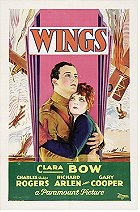 Posted : 14 years, 2 months ago on 24 April 2011 08:17
(A review of Wings (1927))
Posted : 14 years, 2 months ago on 24 April 2011 08:17
(A review of Wings (1927)) 0 comments, Reply to this entry
0 comments, Reply to this entry
Cropsey review
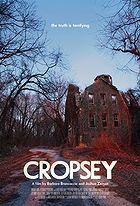 Posted : 14 years, 7 months ago on 14 November 2010 12:08
(A review of Cropsey)
Posted : 14 years, 7 months ago on 14 November 2010 12:08
(A review of Cropsey)A great documentary only needs one thing to be successful. It needs to have a hook, a story that is worth filming and worth sitting through long periods of shaky camera work and muddled dialogue. Fantastic editing and copious amounts of background work can are feathers a great documentary can stick in its cap but if there's no hook then there's no real point.
Cropsey, regrettably, falls into a sort of gray area. The film technique here is wonderful - the opening menus and contextual interludes look great - and the filmmakers effectively utilize first and third person sources in telling their selected story. The problem is the story itself. On paper Cropsey sounds intriguing. It promises to explore the dark, dirty secrets of Staten Island as it uncovers the truth behind a series of child abductions. Indeed the documentary lays down a solid foundation as the filmmakers give us a good sense of place by exploring numerous sites of ill repute dotting the woods on the island. Even the possibly tedious background information regarding the area's numerous kidnappings works in building up the stakes.
Unfortunately the central arc of the story, regarding the incarcerated child abductor accused of the crimes, seems largely pointless. This is a big issue when almost three quarters of the film is devoted to a scruffy old man and his involvement (or apparent lack thereof) in the larger Cropsey mystery. The documentarians did an admirable amount of footwork scoring interviews with the victim's families, eyewitnesses and even striking up a jailhouse correspondence with the accused himself but it all feels pointless. The identity of the accused is revealed early on and its hard to tell what the filmmakers hope to accomplish. They veer all over the place. One moment they're talking to a random guy who describes being kidnapped by the accused from the local YMCA with a busload of children the next they're talking to a guy who insists the accused was wrongfully arrested. They even attempt to inject some mystery to the story by introducing a mysterious second kidnapper and picking some holes in the official story.
However, none of these loose ends are tied together and, at the end of it all, I felt no more enlightened about the child abductions of Staten Island than I did going in. Rather, it felt like I read a bunch of random newspaper clippings and was simply left to sort it out for myself. There's no denying that these were some talented people that made this film but talent can only take you so far in the documentary world. Choosing interesting things to film is the real key to making a documentary...well interesting.
Cropsey, regrettably, falls into a sort of gray area. The film technique here is wonderful - the opening menus and contextual interludes look great - and the filmmakers effectively utilize first and third person sources in telling their selected story. The problem is the story itself. On paper Cropsey sounds intriguing. It promises to explore the dark, dirty secrets of Staten Island as it uncovers the truth behind a series of child abductions. Indeed the documentary lays down a solid foundation as the filmmakers give us a good sense of place by exploring numerous sites of ill repute dotting the woods on the island. Even the possibly tedious background information regarding the area's numerous kidnappings works in building up the stakes.
Unfortunately the central arc of the story, regarding the incarcerated child abductor accused of the crimes, seems largely pointless. This is a big issue when almost three quarters of the film is devoted to a scruffy old man and his involvement (or apparent lack thereof) in the larger Cropsey mystery. The documentarians did an admirable amount of footwork scoring interviews with the victim's families, eyewitnesses and even striking up a jailhouse correspondence with the accused himself but it all feels pointless. The identity of the accused is revealed early on and its hard to tell what the filmmakers hope to accomplish. They veer all over the place. One moment they're talking to a random guy who describes being kidnapped by the accused from the local YMCA with a busload of children the next they're talking to a guy who insists the accused was wrongfully arrested. They even attempt to inject some mystery to the story by introducing a mysterious second kidnapper and picking some holes in the official story.
However, none of these loose ends are tied together and, at the end of it all, I felt no more enlightened about the child abductions of Staten Island than I did going in. Rather, it felt like I read a bunch of random newspaper clippings and was simply left to sort it out for myself. There's no denying that these were some talented people that made this film but talent can only take you so far in the documentary world. Choosing interesting things to film is the real key to making a documentary...well interesting.
 0 comments, Reply to this entry
0 comments, Reply to this entry
Ace in the Hole review
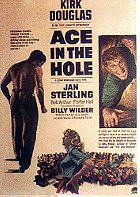 Posted : 15 years, 1 month ago on 2 June 2010 08:56
(A review of Ace in the Hole)
Posted : 15 years, 1 month ago on 2 June 2010 08:56
(A review of Ace in the Hole)When speaking of the great old time directors Billy Wilder is often one of the first names thrown out there. After all, he created some of the most famous and most widely renowned films of Hollywood's bygone era - from Some Like it Hot, to Double Indemnity and, even, to something like The Apartment. Rarely mentioned among those classics is the 1951 drama Ace in the Hole.
Ace in the Hole tells the story of a down on his luck yet still amazingly egotistic journalist Charles Tatum (played by Kirk Douglas) who stumbles into small town Albuquerque looking for a second (or maybe its third) chance to prove his lack of journalistic integrity. Promising to increase circulation through his sensationalistic articles - even if he has to manufacture the news himself - he is hired by the paper's straight laced editor.
The real action kicks off when Tatum stumbles into the story of a lifetime. He encounters Leo Minosa, a man trapped in an unfortunate cave-in and, with the help of that man's rather disinterested wife (Jan Sterling), exploits the situation for all its worth. This is where Ace in the Hole truly shines. Wilder begins with a rather simple situation but, through a rather disturbing chain of events, turns that situation into a full blown circus complete with ever increasing admission prices.
Wilder is almost prescient in the world he creates. We, in the modern world, tend not to look twice when seven media outlets converge on the site of a tragedy. In that way Ace in the Hole is perhaps more resonant today then when it was originally released. It takes a now rather commonplace occurrence and forces the viewer to thoroughly examine their own perspective on the media. By telling the Minosa story through the journalist's lens Wilder is able to personalize what is now seen as an impersonal art. Wilder creates a disturbing situation in which all of the societal elements that should be helping Minosa achieve freedom (from law enforcement to local politicians), instead milk his entrapment for all its worth.
It helps that Douglas' portrayal of Tatum is mostly fantastic. As Tatum realizes just how rotten his actions are (not only is he purposely prolonging the extraction of Minosa but he is also romancing his wife) his inner shame bubbles up until it boils over in a frenetic ending segment. There are elements of his character that are rather unbelievable (the final denouement, while a showcase of impressive acting, seems a bit rushed) but Douglas has the rare ability to grab the watcher by the neck and say take in my character, no matter how repulsive he can be. Unfortunately the side characters are mostly forgettable with rather boring character arcs and average acting performances but its hard to criticize the film for that when it is almost wholly focused on Douglas' turn as Tatum.
The romantic elements also feel rather tacked on, but I think its a testament to Wilder's skill that the relationship between Tatum and Minosa's wife comes off as repugnant. Despite the little screen time devoted to their coupling it is still a memorable part of the story and it still carries a hefty emotional impact. The ending as well feels a bit rushed and conventional - as if Wilder had a direction he wanted to take but was forced down a different path due to stringent Hollywood morality codes.
However, even with those drawbacks, Ace in the Hole is a wonderfully written and deep expose of the seedier side of our media driven world and is filled with singular, memorable moments that define it as an unsung classic. Sticking out in my mind is an effective series of establishing shots that show a filled to the brim ferris-wheel rotating slowly, Minosa's mountainous prison looming in the background and then a group of workmen, taking a lunch break on top of the mountain, gazing out in amazement at the chaotic carnival like scene unfolding below. The story Wilder tells is rather simple, but it is moments like these that make it unforgettable.
Ace in the Hole tells the story of a down on his luck yet still amazingly egotistic journalist Charles Tatum (played by Kirk Douglas) who stumbles into small town Albuquerque looking for a second (or maybe its third) chance to prove his lack of journalistic integrity. Promising to increase circulation through his sensationalistic articles - even if he has to manufacture the news himself - he is hired by the paper's straight laced editor.
The real action kicks off when Tatum stumbles into the story of a lifetime. He encounters Leo Minosa, a man trapped in an unfortunate cave-in and, with the help of that man's rather disinterested wife (Jan Sterling), exploits the situation for all its worth. This is where Ace in the Hole truly shines. Wilder begins with a rather simple situation but, through a rather disturbing chain of events, turns that situation into a full blown circus complete with ever increasing admission prices.
Wilder is almost prescient in the world he creates. We, in the modern world, tend not to look twice when seven media outlets converge on the site of a tragedy. In that way Ace in the Hole is perhaps more resonant today then when it was originally released. It takes a now rather commonplace occurrence and forces the viewer to thoroughly examine their own perspective on the media. By telling the Minosa story through the journalist's lens Wilder is able to personalize what is now seen as an impersonal art. Wilder creates a disturbing situation in which all of the societal elements that should be helping Minosa achieve freedom (from law enforcement to local politicians), instead milk his entrapment for all its worth.
It helps that Douglas' portrayal of Tatum is mostly fantastic. As Tatum realizes just how rotten his actions are (not only is he purposely prolonging the extraction of Minosa but he is also romancing his wife) his inner shame bubbles up until it boils over in a frenetic ending segment. There are elements of his character that are rather unbelievable (the final denouement, while a showcase of impressive acting, seems a bit rushed) but Douglas has the rare ability to grab the watcher by the neck and say take in my character, no matter how repulsive he can be. Unfortunately the side characters are mostly forgettable with rather boring character arcs and average acting performances but its hard to criticize the film for that when it is almost wholly focused on Douglas' turn as Tatum.
The romantic elements also feel rather tacked on, but I think its a testament to Wilder's skill that the relationship between Tatum and Minosa's wife comes off as repugnant. Despite the little screen time devoted to their coupling it is still a memorable part of the story and it still carries a hefty emotional impact. The ending as well feels a bit rushed and conventional - as if Wilder had a direction he wanted to take but was forced down a different path due to stringent Hollywood morality codes.
However, even with those drawbacks, Ace in the Hole is a wonderfully written and deep expose of the seedier side of our media driven world and is filled with singular, memorable moments that define it as an unsung classic. Sticking out in my mind is an effective series of establishing shots that show a filled to the brim ferris-wheel rotating slowly, Minosa's mountainous prison looming in the background and then a group of workmen, taking a lunch break on top of the mountain, gazing out in amazement at the chaotic carnival like scene unfolding below. The story Wilder tells is rather simple, but it is moments like these that make it unforgettable.
 0 comments, Reply to this entry
0 comments, Reply to this entry
Bad Boys review
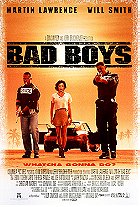 Posted : 15 years, 1 month ago on 21 May 2010 08:53
(A review of Bad Boys)
Posted : 15 years, 1 month ago on 21 May 2010 08:53
(A review of Bad Boys)If you like explosions, shoddy dialogue and plenty of race-themed humor than it is likely that Michael Bay's Bad Boys is one of your favorite movies. If you like a sensible plot, well constructed action scenes and acting performances that rise above the level of a cereal commercial then my question is...why the hell are you watching a Michael Bay film?
Released in 1995 Bay's Bad Boys follows two detectives (played ably by Martin Lawrence and Will Smith) as they attempt to recover a bunch of drugs that disappeared from the evidence locker at their police station. Since that is, apparently, not enough impetus for an action-packed comedic farce Bay decides that suave talking ladies man Smith and whipped homebody Lawrence should switch roles halfway through the film (with Smith pretending to be Lawrence and vice-versa). It's a completely unreasonable setup, yes, but there is indeed the possibility of comedic gold here. Oh, and explosions. And car chases.
On the last two counts Bad Boys does indeed deliver. The plot is poorly paced and overly complicated with most of the nonsensical action packed into the tail end of the movie but it mostly looks good. Sure the next set piece is often obviously telegraphed (there can't be a shootout here...there's no explosive barrels!) but as long as the explosions are pulled off well who cares. Sometimes the sequences go on too long and it seems as if Bay is grasping at straws to increase the variety of objects that are exploded or crashed into and sometimes the quick cuts are frustrating and obscure more than they show but, for the most part, the action is competently done.
Sadly, despite what the commercials and flame-tinged promotional posters may make you believe this really only qualifies as half an action movie. The main chunk of the movie is devoted to the comedic, buddy cop interplay between Smith and Lawrence and the flimsily constructed premise that they must pretend to be each other in order to fool a state's witness (Tea Leoni is excruciating in this role). I'm not expecting Shakespeare (after all he wasn't very funny) but the humor here is mostly non-existent. There are moments of levity, like when Lawrence tries to explain the homo-erotic self-portraits of Smith that are hung in what Leoni assumes is Lawrence's apartment or when Smith and Lawrence engage in witty racially fueled banter with the Italians on the force but I generally found more humor in the idea that Lawrence must assume Smith's characteristics to fool a state's witness that knew neither of the cops prior to the proverbial drug deal gone bad.
Smith and Lawrence are mostly charming (except when they're ad-libbing) but, like a watch salesman hawking Drolexes, that charm can only carry the dialogue so far. Also if, God forbid they're forced to do a scene with any of the other actors in this movie, then you're better off simply fast-forwarding a few minutes. The central plot is non-sensical enough that you won't miss much.
Ultimately, Bad Boys is stuck in the purgatory of the action comedy world. It's action is sometimes entertaining but there's nothing here to show off that new 55 inch plasma you bought after remortgaging your house and the writing sometimes elicits a chuckle but there's nothing here that's belongs in the annals with the great buddy cop films of the past. It's like a second-rate Lethal Weapon for the ritalin generation - something you can put on the the background while working on spreadsheets or something. Sure that explosion will make you look up but don't worry - you didn't miss a thing.
Released in 1995 Bay's Bad Boys follows two detectives (played ably by Martin Lawrence and Will Smith) as they attempt to recover a bunch of drugs that disappeared from the evidence locker at their police station. Since that is, apparently, not enough impetus for an action-packed comedic farce Bay decides that suave talking ladies man Smith and whipped homebody Lawrence should switch roles halfway through the film (with Smith pretending to be Lawrence and vice-versa). It's a completely unreasonable setup, yes, but there is indeed the possibility of comedic gold here. Oh, and explosions. And car chases.
On the last two counts Bad Boys does indeed deliver. The plot is poorly paced and overly complicated with most of the nonsensical action packed into the tail end of the movie but it mostly looks good. Sure the next set piece is often obviously telegraphed (there can't be a shootout here...there's no explosive barrels!) but as long as the explosions are pulled off well who cares. Sometimes the sequences go on too long and it seems as if Bay is grasping at straws to increase the variety of objects that are exploded or crashed into and sometimes the quick cuts are frustrating and obscure more than they show but, for the most part, the action is competently done.
Sadly, despite what the commercials and flame-tinged promotional posters may make you believe this really only qualifies as half an action movie. The main chunk of the movie is devoted to the comedic, buddy cop interplay between Smith and Lawrence and the flimsily constructed premise that they must pretend to be each other in order to fool a state's witness (Tea Leoni is excruciating in this role). I'm not expecting Shakespeare (after all he wasn't very funny) but the humor here is mostly non-existent. There are moments of levity, like when Lawrence tries to explain the homo-erotic self-portraits of Smith that are hung in what Leoni assumes is Lawrence's apartment or when Smith and Lawrence engage in witty racially fueled banter with the Italians on the force but I generally found more humor in the idea that Lawrence must assume Smith's characteristics to fool a state's witness that knew neither of the cops prior to the proverbial drug deal gone bad.
Smith and Lawrence are mostly charming (except when they're ad-libbing) but, like a watch salesman hawking Drolexes, that charm can only carry the dialogue so far. Also if, God forbid they're forced to do a scene with any of the other actors in this movie, then you're better off simply fast-forwarding a few minutes. The central plot is non-sensical enough that you won't miss much.
Ultimately, Bad Boys is stuck in the purgatory of the action comedy world. It's action is sometimes entertaining but there's nothing here to show off that new 55 inch plasma you bought after remortgaging your house and the writing sometimes elicits a chuckle but there's nothing here that's belongs in the annals with the great buddy cop films of the past. It's like a second-rate Lethal Weapon for the ritalin generation - something you can put on the the background while working on spreadsheets or something. Sure that explosion will make you look up but don't worry - you didn't miss a thing.
 0 comments, Reply to this entry
0 comments, Reply to this entry
Bus 174 review
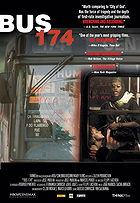 Posted : 15 years, 1 month ago on 10 May 2010 11:07
(A review of Bus 174)
Posted : 15 years, 1 month ago on 10 May 2010 11:07
(A review of Bus 174)The directorial debut of Jose Padilha the 2002 documentary Bus 174 examines the hijacking of a Brazilian transit bus, paying particular attention to cause and effect relationship of Brazilian society.
It does this through a thorough examination of the life and actions of the hijacker, Sandro, in an attempt to give reason to an unreasonable action.
The strongest part of this story is that of the hijacking itself. Told through archival footage, security tapes and numerous interviews with police, hostages and family the saga of the bus itself is gripping and emotional. When properly integrated into the story of Bus 174 the larger tale of a country that abandons and mistreats its impovershed citizens is truly impactful. For instance, when Sandro yells out his window about the massacre of Candelaria the film uses that cue to explore that tragedy. This is an effective way to flesh out Sandro's origins and, perhaps, give the viewer some insight into his twisted actions.
However, there are also numerous moments where Padilha takes the viewer out of the story of Sandro and bus 174 and plops us in front of sociological talking heads that bemoan Brazil's mistreatment of its underclass and plea for the recognition of the invisible children. This, decidedly, doesn't work. Forcing this information down the viewer's throat out of the context of the tragedy of bus 174 is the film's biggest weakness. The biographical sketches of Sandro that are directly tied into the narrative of the bus hijacking gave me more than enough insight into the cultural considerations that led Sandro down the criminal path. Hammering on those considerations repeatedly, especially near the beginning of the story when Sandro hasn't been properly fleshed out, made the film feel manipulative, obvious and left a bad taste in my mouth right from the outset. Subtlety is key, and when Padilha is subtle it works perfectly.
There are times when the story seems a bit biased to the plight of the hijacker and the interviews with the favela kids - probably intended to flesh out Sandro's background - seem a bit staged and strangely translated (a 16 year old from the slums of Rio de Janeiro says "ruckus?") but, for the most part, Bus 174 is an effective and fascinating tale of a divided country. As the film closes and we hear the citizens of Brazil - the mother, the hostage, the policeman, the gangster, the social worker - mull over the events of that fateful day the film's intended portrait of Brazil becomes crystal clear (and without a 55 year old sociologist telling me what to feel!). It is a country with a wide division between the general populace and those that many feel should simply disappear and, when one of the latter acts out in such a shockingly public fashion no one really knows what to do. It becomes a tragedy for many.
It does this through a thorough examination of the life and actions of the hijacker, Sandro, in an attempt to give reason to an unreasonable action.
The strongest part of this story is that of the hijacking itself. Told through archival footage, security tapes and numerous interviews with police, hostages and family the saga of the bus itself is gripping and emotional. When properly integrated into the story of Bus 174 the larger tale of a country that abandons and mistreats its impovershed citizens is truly impactful. For instance, when Sandro yells out his window about the massacre of Candelaria the film uses that cue to explore that tragedy. This is an effective way to flesh out Sandro's origins and, perhaps, give the viewer some insight into his twisted actions.
However, there are also numerous moments where Padilha takes the viewer out of the story of Sandro and bus 174 and plops us in front of sociological talking heads that bemoan Brazil's mistreatment of its underclass and plea for the recognition of the invisible children. This, decidedly, doesn't work. Forcing this information down the viewer's throat out of the context of the tragedy of bus 174 is the film's biggest weakness. The biographical sketches of Sandro that are directly tied into the narrative of the bus hijacking gave me more than enough insight into the cultural considerations that led Sandro down the criminal path. Hammering on those considerations repeatedly, especially near the beginning of the story when Sandro hasn't been properly fleshed out, made the film feel manipulative, obvious and left a bad taste in my mouth right from the outset. Subtlety is key, and when Padilha is subtle it works perfectly.
There are times when the story seems a bit biased to the plight of the hijacker and the interviews with the favela kids - probably intended to flesh out Sandro's background - seem a bit staged and strangely translated (a 16 year old from the slums of Rio de Janeiro says "ruckus?") but, for the most part, Bus 174 is an effective and fascinating tale of a divided country. As the film closes and we hear the citizens of Brazil - the mother, the hostage, the policeman, the gangster, the social worker - mull over the events of that fateful day the film's intended portrait of Brazil becomes crystal clear (and without a 55 year old sociologist telling me what to feel!). It is a country with a wide division between the general populace and those that many feel should simply disappear and, when one of the latter acts out in such a shockingly public fashion no one really knows what to do. It becomes a tragedy for many.
 0 comments, Reply to this entry
0 comments, Reply to this entry
Note by Note: The Making of Steinway L1037 review
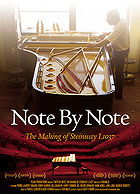 Posted : 15 years, 1 month ago on 10 May 2010 08:02
(A review of Note by Note: The Making of Steinway L1037)
Posted : 15 years, 1 month ago on 10 May 2010 08:02
(A review of Note by Note: The Making of Steinway L1037)The best documentaries are so well crafted that a viewer - even one that is unfamiliar or uninterested in the topic at hand - is drawn into its world.
Regrettably Note by Note: The Making of Steinway L1037 is not one of the best. The film ostensibly follows the creation of a Steinway piano. The Steinway company is unique in that it employs a variety of skilled builders to create their largely handcrafted grand piano instruments. This creative process is easily to star of the film. It is a fascinating world of classically trained every-men; cigarette smoking oddballs that bring an artisan's touch to the finite details of each piano they craft. The amount of time and skill that goes into each instrument is astounding and endlessly impressive.
Where the movie falters is when it steps off the assembly line floor. While it is strangely transfixing to watch a tattooed tuner play beautiful music on the piano he's helping to build the movie goes a bit far with its love affair of the Steinway. It is an instrument that best speaks for itself, and the soundtrack - made entirely of pieces played on the Steinway by professional musicians like Harry Connick Jr - is phenomenal. However, I could have done without the repeated bouts of effusive praise laid upon the instrument by a bunch of talking heads. Listening to Connick Jr.'s music is fascinating, listening to him ramble on about his music is not. These interludes create a more disjointed narrative and, as the film goes on, it is hard to keep track of where exactly we are in the process of creating a Steinway.
There are moments when the stories of the pianists and their Steinways are as interesting as the creation of the Steinway itself (I particularly enjoyed the stories of the teen whose playing reminded his grandfather of his skill and the saga of the picky Pierre-Laurent Aimard searching for the perfect piano) but those moments are regrettably few.
Still, it is a mostly fascinating look into a world of skilled handiwork that is dangerously close to becoming extinct that really gives the viewer a good idea of how much soul goes into (and consequently comes out of) a Steinway.
Regrettably Note by Note: The Making of Steinway L1037 is not one of the best. The film ostensibly follows the creation of a Steinway piano. The Steinway company is unique in that it employs a variety of skilled builders to create their largely handcrafted grand piano instruments. This creative process is easily to star of the film. It is a fascinating world of classically trained every-men; cigarette smoking oddballs that bring an artisan's touch to the finite details of each piano they craft. The amount of time and skill that goes into each instrument is astounding and endlessly impressive.
Where the movie falters is when it steps off the assembly line floor. While it is strangely transfixing to watch a tattooed tuner play beautiful music on the piano he's helping to build the movie goes a bit far with its love affair of the Steinway. It is an instrument that best speaks for itself, and the soundtrack - made entirely of pieces played on the Steinway by professional musicians like Harry Connick Jr - is phenomenal. However, I could have done without the repeated bouts of effusive praise laid upon the instrument by a bunch of talking heads. Listening to Connick Jr.'s music is fascinating, listening to him ramble on about his music is not. These interludes create a more disjointed narrative and, as the film goes on, it is hard to keep track of where exactly we are in the process of creating a Steinway.
There are moments when the stories of the pianists and their Steinways are as interesting as the creation of the Steinway itself (I particularly enjoyed the stories of the teen whose playing reminded his grandfather of his skill and the saga of the picky Pierre-Laurent Aimard searching for the perfect piano) but those moments are regrettably few.
Still, it is a mostly fascinating look into a world of skilled handiwork that is dangerously close to becoming extinct that really gives the viewer a good idea of how much soul goes into (and consequently comes out of) a Steinway.
 0 comments, Reply to this entry
0 comments, Reply to this entry
Shattered Glass review
 Posted : 15 years, 1 month ago on 10 May 2010 01:15
(A review of Shattered Glass)
Posted : 15 years, 1 month ago on 10 May 2010 01:15
(A review of Shattered Glass)Retelling the truly fascinating story of journalist Stephen Glass who was able to fool the New Republic and several other credible publications with his partially (and sometimes completely) fabricated articles Billy Ray's Shattered Glass is a bit of a mixed bag.
It does a solid job of recounting the basic facts surrounding Glass' deceptions and is helped along nicely by a wonderful performance by Hayden Christensen who perfectly embodies the charms and annoyances of an overeager, endlessly deceptive human being. However, there are numerous secondary characters that simply populate the screen. Peter Sarsgaard as Glass' editor and Steve Zahn as the man who finally sees through the deceptions are mostly bland and seem poor foils for Christensen's Glass.
This is a shame because the story is very fascinating. Its just that when the performances are mostly flat one has a hard time believing that the stakes (I think Ray intends to have his viewers believe that journalistic integrity is on the line here) are truly getting raised. The moments in which the movie should be at its peak are instead its weakest. When Glass' fabrications are found out by Zahn it is almost unbelievable. As a viewer it is hard to be on the edge of your seat when the only detective work needed to break one of history's greatest stories about the failure of journalistic integrity is a couple of Yahoo searches and some phone calls.
That being said there is definitely some interesting stuff at work here. Ray effectively blurs the line between reality and fiction, a motif that gives real insight into the titular persona and his portrayal of a man on the verge of losing his livelihood is particularly resonant. Strangely enough it could have used a bit of the Stephen Glass treatment. Instead of simply retelling events faithfully (which I believe Ray does) he could have punched the story up a bit to give the viewer a palpable sense of tension and importance. Taken as a portrait of a quasi-artist, however, Shattered Glass is a success.
It does a solid job of recounting the basic facts surrounding Glass' deceptions and is helped along nicely by a wonderful performance by Hayden Christensen who perfectly embodies the charms and annoyances of an overeager, endlessly deceptive human being. However, there are numerous secondary characters that simply populate the screen. Peter Sarsgaard as Glass' editor and Steve Zahn as the man who finally sees through the deceptions are mostly bland and seem poor foils for Christensen's Glass.
This is a shame because the story is very fascinating. Its just that when the performances are mostly flat one has a hard time believing that the stakes (I think Ray intends to have his viewers believe that journalistic integrity is on the line here) are truly getting raised. The moments in which the movie should be at its peak are instead its weakest. When Glass' fabrications are found out by Zahn it is almost unbelievable. As a viewer it is hard to be on the edge of your seat when the only detective work needed to break one of history's greatest stories about the failure of journalistic integrity is a couple of Yahoo searches and some phone calls.
That being said there is definitely some interesting stuff at work here. Ray effectively blurs the line between reality and fiction, a motif that gives real insight into the titular persona and his portrayal of a man on the verge of losing his livelihood is particularly resonant. Strangely enough it could have used a bit of the Stephen Glass treatment. Instead of simply retelling events faithfully (which I believe Ray does) he could have punched the story up a bit to give the viewer a palpable sense of tension and importance. Taken as a portrait of a quasi-artist, however, Shattered Glass is a success.
 0 comments, Reply to this entry
0 comments, Reply to this entry
The Wild Parrots of Telegraph Hill review
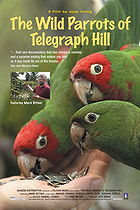 Posted : 15 years, 1 month ago on 7 May 2010 10:50
(A review of The Wild Parrots of Telegraph Hill)
Posted : 15 years, 1 month ago on 7 May 2010 10:50
(A review of The Wild Parrots of Telegraph Hill)Its not a particularly earth-shattering documentary but it is an interesting slice of life piece that explores the things that many people probably never notice in the world around them.
The last place many would expect to find a flock of exotic parrots is in the middle of San Francisco but director Judy Irving finds just this and a rather philosophical keeper of the birds that goes to great lengths to point out their wildness despite the fact that he feeds and names the members of his flock.
The film basically tells the story of that man's relationship with the birds only briefly interspersing it with man on the street interviews that touch on the mysterious origins of the flock and the (slightly) varied public opinion on the man and his brood.
This, of course, brings me to film's greatest shortcoming. While there is some interesting and surprisingly emotional stuff to be found in the story of the birds the film focuses mostly on their human counterpart. He is fleshed out a bit towards the end, but for most of the movie he simply comes off as a strange, rather unassuming and uninteresting coot. The film only goes as far as its protagonist lets it and, for the most part, he just wasn't that compelling. But, if you are willing to put up with his company for the majority of the film there is some fascinating stuff to be found on the parrots themselves.
The last place many would expect to find a flock of exotic parrots is in the middle of San Francisco but director Judy Irving finds just this and a rather philosophical keeper of the birds that goes to great lengths to point out their wildness despite the fact that he feeds and names the members of his flock.
The film basically tells the story of that man's relationship with the birds only briefly interspersing it with man on the street interviews that touch on the mysterious origins of the flock and the (slightly) varied public opinion on the man and his brood.
This, of course, brings me to film's greatest shortcoming. While there is some interesting and surprisingly emotional stuff to be found in the story of the birds the film focuses mostly on their human counterpart. He is fleshed out a bit towards the end, but for most of the movie he simply comes off as a strange, rather unassuming and uninteresting coot. The film only goes as far as its protagonist lets it and, for the most part, he just wasn't that compelling. But, if you are willing to put up with his company for the majority of the film there is some fascinating stuff to be found on the parrots themselves.
 0 comments, Reply to this entry
0 comments, Reply to this entry
Street Fight (2005) review
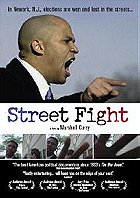 Posted : 15 years, 2 months ago on 25 April 2010 10:53
(A review of Street Fight (2005))
Posted : 15 years, 2 months ago on 25 April 2010 10:53
(A review of Street Fight (2005))I feel this is one of the best documentaries of all times. It takes a ridiculously complex system (that being America's electoral process) and gives the viewer a great idea of how it all works in less than two hours.
In Street Fight you get to see the full process warts and all. You get a great "villain" (the incumbent Newark mayor Sharpe James) and a great, shining hero (upstart opponent Cory Booker) and you get to see all the convoluted machinations and strategies each side uses to get out/keep in the vote. It is, of course, biased towards one side but that's how elections are.
In a perfect world, it would be required viewing for high school social studies students that are preparing to vote for the first time.
In Street Fight you get to see the full process warts and all. You get a great "villain" (the incumbent Newark mayor Sharpe James) and a great, shining hero (upstart opponent Cory Booker) and you get to see all the convoluted machinations and strategies each side uses to get out/keep in the vote. It is, of course, biased towards one side but that's how elections are.
In a perfect world, it would be required viewing for high school social studies students that are preparing to vote for the first time.
 0 comments, Reply to this entry
0 comments, Reply to this entry
Altered (2006) review
 Posted : 15 years, 2 months ago on 25 April 2010 10:33
(A review of Altered (2006))
Posted : 15 years, 2 months ago on 25 April 2010 10:33
(A review of Altered (2006))This is a strange one. I had relatively high expectations since I absolutely loved Sanchez's Blair Witch Project but to say I was disappointed would be a bit of an understatement.
The characters are mostly annoying and the story is largely non-sensical and poorly told. The longer it goes on the more it feels as though the movie is mocking itself and it just doesn't work.
The characters are mostly annoying and the story is largely non-sensical and poorly told. The longer it goes on the more it feels as though the movie is mocking itself and it just doesn't work.
 0 comments, Reply to this entry
0 comments, Reply to this entry
 Login
Login
 Home
Home 34 Lists
34 Lists 85 Reviews
85 Reviews Collections
Collections